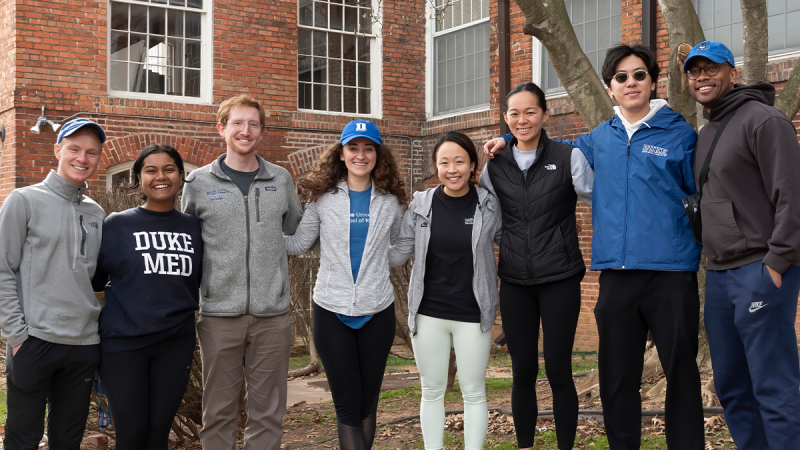
Making a House a Home: Student Group Fills Gap for Those Experiencing Homelessness
Moving into a new home can bring about a mix of feelings, from joy to stress. But for someone just getting back on their feet after experiencing homelessness, the transition can be that much harder, and at times, isolating.
A program led by Duke University School of Medicine students is helping to make the transition to stable housing easier for people who have a history of homelessness. The WellNest Housing Support Program offers newly housed individuals support on the day of their move, and in some cases, well beyond. The program also gives students a better understanding of the impact housing can have on a person’s health.
The idea for the program came about in 2019 when the Durham County Community Health Assessment identified affordable housing and homelessness as the top community health priorities. Tamar Chukrun had an interest in helping individuals who were unhoused but wasn’t sure how to pursue the work as a medical student. After Chukrun and a few fellow students talked with local organizations, they discovered an existing gap in supporting unhoused individuals.
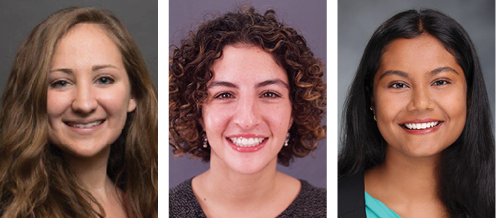
“We put resources into helping people find housing,” said Chukrun, a fourth-year medical student. “But then when it comes to the move-in, there are not as many resources to help people pack up their belongings, move them, get furniture, and settle into their space. Oftentimes, caseworkers are doing that work for free on their weekends. Students could help fill that gap.”
“People often don't realize that the first year of moving into housing is considered the most critical period,” said Trisha Dalapati, an MD/PhD student and one of WellNest’s founders. “If you don't adjust to housing, it could mean relapse back into being unhoused.”
When WellNest officially started in 2020, the program had about 10 volunteers from the medical school. It has since grown to a group of more than 100 volunteers that include graduate, professional, and undergraduate students from across Duke as well. Durham community members, Duke employees, and students from UNC-Chapel Hill have also volunteered with WellNest. (A full list of WellNest’s student leaders is available online.)
The program was initially funded through the Duke Chancellor’s Service Fellowship and the Albert Schweitzer Fellowship. Now, it is almost exclusively supported by community donations made to a GoFundMe page and funding from the local organization, Durham Homeless Care Transitions, a program of Project Access of Durham County (PADC). WellNest primarily serves individuals in Durham.
Helping Neighbors
WellNest receives referrals mainly from two nonprofit organizations, Durham Homeless Care Transitions and the Community Empowerment Fund. These organizations provide intensive case management to connect individuals experiencing homelessness to limited and difficult-to-obtain permanent housing opportunities, which may include private landlords or Durham Housing Authority properties.
When the case management team is in the process of finalizing a lease, the individual is then referred to the WellNest Program.
The students, who call the individuals they help “neighbors,” then get to work planning the neighbor’s move, which sometimes can take months, while other times a move can happen in just a week. The students plan nearly every detail of the move, including renting a moving truck, sourcing furniture for the new home through community donations, and recruiting volunteers to help with the move-in.
Since spring 2020, WellNest has supported more than 40 Durham and Chapel Hill community members in their moves and has collected approximately 200 pieces of furniture to donate. The program’s motto is “Building a community where every neighbor feels at home.”
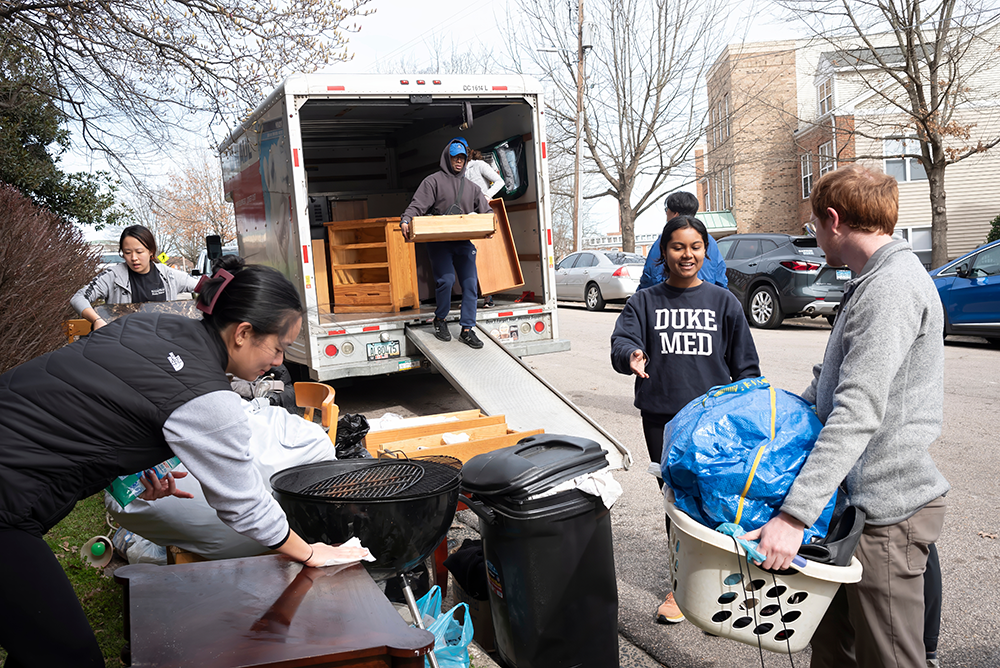
“People who are experiencing homelessness or are temporarily unhoused come from all kinds of backgrounds,” Dalapati said. “They are truly our neighbors.”
WellNest volunteers helped Durham native Dwight Black move twice. He had been in the hospital for two months, and once discharged, he said he had nowhere to go. Durham Homeless Care Transitions/PADC case managers assisted him with finding permanent housing and referred him to WellNest for his first move. When his care management team helped him acquire an opportunity at a subsidized senior housing complex, WellNest was ready again to help him with the challenge of moving into his next home—something he couldn’t physically do by himself.
“They gave me a couch, desk, a bed, and some lamps,” Black said. “If they hadn’t helped me out, I don’t know who would have helped me.”
Overcome with gratitude, Black felt moved to sing the students a song on the day of his move.
“I told them I didn’t have money to give them. They said, ‘Well you don’t owe us anything.’ So, I said, ‘I’ll sing a song.’ I offered them that,” said Black, who is a member of a singing group called, Sons of New Bethel.
A Human Connection
Julia Gamble, who is one of three mentors to the WellNest student volunteers, said the connection made that day between Black and the students represents something greater than simply helping a neighbor move.
“It's about creating this connection, this humanness, this beautiful realization of the full person,” said Gamble, a nurse practitioner at the Duke Outpatient Clinic and clinical director of Durham Homeless Care Transitions.
“A lot of times people have fixed perspectives about what homelessness looks like and who homeless people are,” Gamble added. “Creating one-on-one connections between an individual who has experienced homelessness and an individual medical student or health profession student allows for the ability to see people as people.”
Making that human connection is an important part of the process of learning to care for patients.
"When you're living on the street, you don't know if you are physically safe at any time. These things impact your mental health and your physical health too."
- Maddie Brown Duke University medical student
As future providers, many of the WellNest student volunteers are getting a better perspective of the impact homelessness can have on a patient’s health. They are also learning about the barriers to care that unhoused patients can encounter, such as lack of transportation which can make it hard to get to medical appointments or pick up prescriptions.
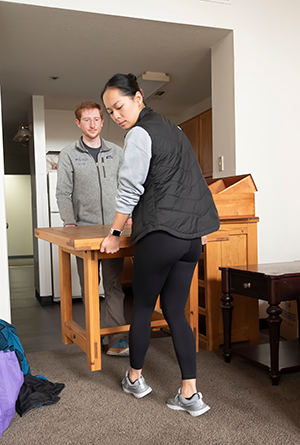
“If there’s black mold in someone’s apartment or a person with diabetes doesn’t have a fridge to store insulin, those are very clear connections between housing and health,” said Maddie Brown, a third-year medical student and a program manager for WellNest. “But there’s also a lack of psychological safety if someone is truly unsheltered. When you're living on the street, you don't know if you are physically safe at any time. These things impact your mental health and your physical health too.”
“At times we see health professions students say, ‘Oh, the person's non-compliant,’” said Donna Biederman, DrPH, MN, RN, CPH, FAAN, clinical professor in the School of Nursing. “Health professionals say that all the time as well, when in reality, there are a lot of barriers to compliance. The students are learning this firsthand.”
Biederman also serves as a mentor to the WellNest students, along with Sally Wilson, MDiv, executive director of Project Access of Durham County. The three mentors meet with the WellNest student leaders weekly and offer advice on research, grant writing, working with the neighbors and caseworkers, and other topics.
Long-term Support
In addition to helping with the move-in process, WellNest also provides neighbors with long-term support once they have settled into their new home through its Longitudinal Tenancy Program.
Volunteers check in with neighbors for at least a year, helping neighbors find additional furniture items, connect to additional health or social services, map transportation routes in their new area, and set goals to combat social isolation and build community in their new residence. WellNest has maintained 12 long-term relationships with community members through the Longitudinal Tenancy Program.
“Our longitudinal tenancy volunteers provide an extra layer of support so that things that are critical to housing outcomes don’t fall through the cracks,” Dalapati said.
WellNest leaders, including Dalapati, Brown, and Chukrun, recently evaluated the outcomes of WellNest, which will be published in a research paper in Academic Medicine.
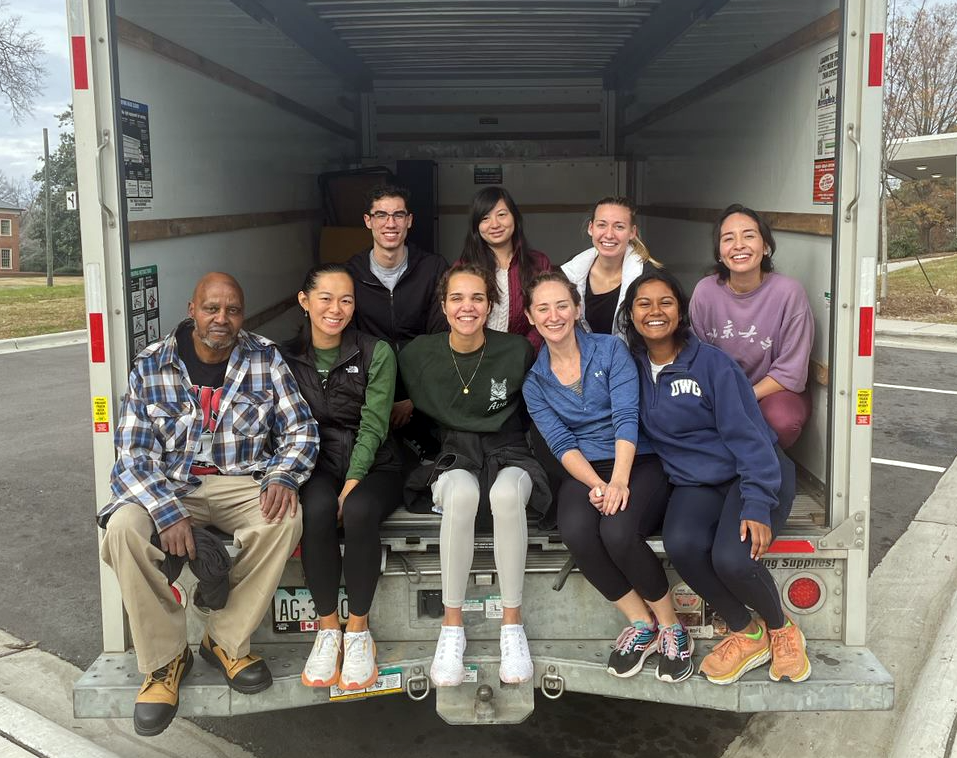
Bernadette Gillis is a communications strategist in the School of Medicine’s Office of Strategic Communications.
